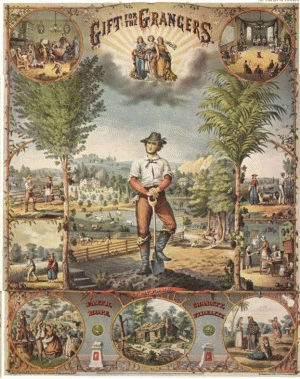Farmers claim to be stewards of the environment, some would say it's best friend; others, its worst enemy. The truth is we can be both.
Humans have never left a small footprint, we have always tried to shape the environment to suit our needs. Initially farming had one purpose, food; farming provided a more stable diet than the hunter-gatherer existence.
As we became more "civilized" our effect on the land became more pronounced and more devastating. We thought the oceans were too vast, the soil too deep and the forests so thick that we could never harm them and, of course, we were wrong.
We used to grow food and fiber, now we raise commodity crops and commodity livestock. Farmers, for the most part, no longer sell to the consumer, they sell to processors who slice, dice, mince, preserve, pasteurize, color, flavor, package and deliver what they call food.
Agricultural production is neither controlled by nor is it supportive of farmers or consumers. Farmers have no control over prices so they do what they must to survive. Consumers buy what the global market provides, is there a choice?
We produce more than enough to feed the world. Yet, not everyone shares the bounty. Not everyone has the money or the access. Equally as sad, by the time the processors are done with their slicing, dicing, coloring and flavoring much of the "food" they deliver assaults, rather than supports our health.
The World Wildlife Fund (WWF) claims agriculture is one of the biggest threats to the environment. The National Cattleman's Beef Association (NCBA) says agriculture does not harm the environment.
The University of Minnesota cites a seven fold increase in use of nitrogen fertilizer, a three fold increase in phosphorous fertilizer and a near doubling of irrigated cropland between 1961 and 1996. Since the introduction of Genetically Modified crops in 1996, fertilizer and pesticide use have steadily increased.
WWF notes global agriculture uses 70% of the worlds water and threatens the oceans with agrochemicals and the atmosphere with greenhouse gases from livestock production.
The US Geological Survey points to fertilizer, manure and agricultural runoff from the Mississippi basin as being responsible for the Gulf "Dead Zone".
The United Nations estimates that farm animals world-wide generate 18% of the worlds greenhouse gas emissions. Couple that with emissions from transportation, refrigeration, clearing land for crops and pastures and livestock do not appear as environmentally benign as NCBA would have us believe.
Concentrated Animal Feeding Operations (CAFO's) have a negative affect on our health as well. The 2004 outbreaks of avian flu in Laos and Nigeria occurred on CAFO's and the current swine flu epidemic has Mexican lawmakers pointing the finger at CAFO's while Mexican health officials back them up.
CAFO's, crop production, water, processing and transportation comprise an industrial agricultural system that is no friend of the environment. The argument supporting the system,"we need to feed the world", is a lie. As the system industrialized, world hunger increased.
In the end the question is, who will decide if agriculture will protect or destroy the environment?
We can continue to allow multinational agribusiness corporations and industrial agriculture to control our food system. We can continue to accept CAFO's, mono-culture cropping and the inherent environmental damage they cause. Or we can think about the environment and humanity when we make our food choices. We can, as Michael Pollan says, "Eat food. Not too much. Mostly plants".
We need to think before we eat.





